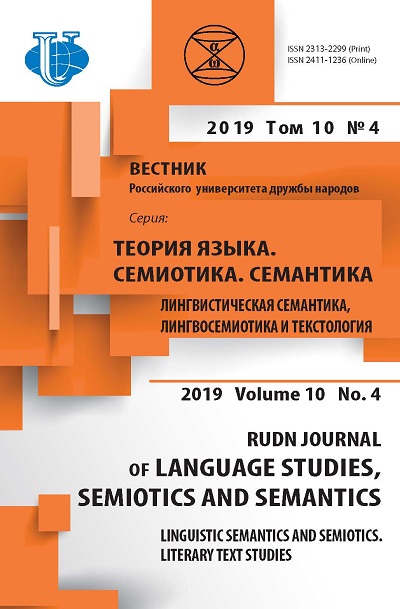Metaphorical Potential of Slang Language: some Results of the Pilot Experiment
- Authors: Dilanova E.A.1
-
Affiliations:
- Kursk State University, Kursk, Russian Federation
- Issue: Vol 10, No 4 (2019): Linguistic Semantics and Semiotics. Literary Text Studies
- Pages: 871-878
- Section: FUNCTIONAL SEMANTICS
- URL: https://journals.rudn.ru/semiotics-semantics/article/view/22773
- DOI: https://doi.org/10.22363/2313-2299-2019-10-4-871-878
- ID: 22773
Cite item
Full Text
Abstract
This article is devoted to the study of the slang language of youth on the basis of the results of a pilot free associative experiment. The purpose of this study is to identify the content of the stereotypical notions for native speakers, and to reveal the links that exist in the conceptual system of native speakers. In this regard, a pilot associative experiment was conducted among 40 students, belonging to the youth, who are either native English speakers or who speak English fluently. There were also presented the results of a free associative experiment aimed at identifying components that reflect national and individual characteristics of the perception of slangism, as well as the metaphorical characteristics of naive discourse, which are universal for young people. In addition, we were able to identify the influence of extra-linguistic factors on the content of the associative thesaurus.
Keywords
About the authors
E. A. Dilanova
Kursk State University, Kursk, Russian Federation
Author for correspondence.
Email: urban044@mail.ru
33, Radisheva st., Kursk, Russian Federation, 305000
References
- Beregovskaya, E.M. (1996). Youth slang: formation and functioning, Questions of linguistics, 3, 32—41. (In Russ.).
- Polivanov, E.D. (1931). Marxist linguistics. Moscow: Federation, 1931. (In Russ.).
- Thorne T. (2005). Dictionary of Contemporary Slang — A & C Black Publishers Ltd.
- Kryuchkova, N.V. (2005). Linguocultural variation of concepts. Saratov: Nauchnaja kniga. (In Russ.).
- Karaulov, Yu.N. (1994). Russian associative dictionary as a new linguistic source and tool for the analysis of language ability // Russian Associative Dictionary. Moscow: Pomovsky and partners, 1994. Book 1: Direct vocabulary: from stimulus to reaction. Associative thesaurus of modern Russian language. Part 1. (In Russ.).
- Leontiev, A.A. (1969). Vocabulary of stereotypical associations of the Russian language, its theoretical foundations, tasks and importance for teaching the Russian language to foreigners In Questions of educational lexicography. Moscow. pp. 114—128. (In Russ.).
- Zalevskaya, A.A. (1987). Some ways to study the psychological structure of the meaning of keywords in order to optimize inter-ethnic communication In Translation and automatic text processing. Moscow. pp. 46—58. (In Russ.).
- Tarasov, E.F. (2004). Linguistic consciousness, Questions of psycholinguistics, 2, 34—47. (In Russ.).
- Orlova, V.V. Social maturity of youth: the socio-psychological aspect In Youth in the social structure of Russian society URL: http://econf.rae.ru/article/4479 (accessed: 05/09/2018). (In Russ.).
- Zubkova, O.S. (2014). Terminological derivation of professional metaphor: linguosemiotic aspect, News of South-West State University. Scientific peer-reviewed journal. Series: Linguistics and Pedagogy, 2, 32—36.
- Latysheva, V.L. (2010). National precedent phenomena as elements of the associative thesaurus of Russian and French (according to experimental research), Bulletin of the Irkutsk State Linguistic University, 4 (12), 110—118.
- Zubkova, O.S. (2006). The specifics of the functioning of the metaphor in the individual lexicon [dissertation]. Kursk.
- URL: https://www.urbandictionary.com (accessed: 05/09/2018).
- Zubkova, O.S. (2013). The specifics of the objectification of meaningful practices in the framework of an integrated linguosemiotic space, Theory of language and intercultural communication. Science Magazine, 1 (13) [Electronic resource] URL: http://tl-ic.kursksu.ru/pdf/013-005.pdf (accessed: 05/09/2018).
- Zubkova, O.S. (2010). Medical metaphor-term as mental representation, Questions of cognitive linguistics. Scientific and theoretical journal, 3, 41—48.
Supplementary files












